Ethical Considerations in Psychological Research: A Case Study
VerifiedAdded on 2022/09/06
|5
|892
|26
Essay
AI Summary
This essay critically analyzes the ethical issues surrounding the Stanford Prison Experiment, a highly controversial study conducted by Philip Zimbardo in 1971. The essay presents arguments both for and against the ethical validity of the experiment, considering the context of the time when ethical guidelines for psychological research were not as well-defined. It explores the concept of deindividuation and the potential for harm to participants, referencing the BPS code of ethics and judicial laws. The essay ultimately concludes that, while debatable due to the lack of established ethical codes at the time, the Stanford Prison Experiment raises significant ethical concerns. The essay provides a detailed overview of the experiment's methodology, the behaviors of participants, and the lasting impact on the field of psychology, offering a comprehensive examination of the experiment's ethical implications.
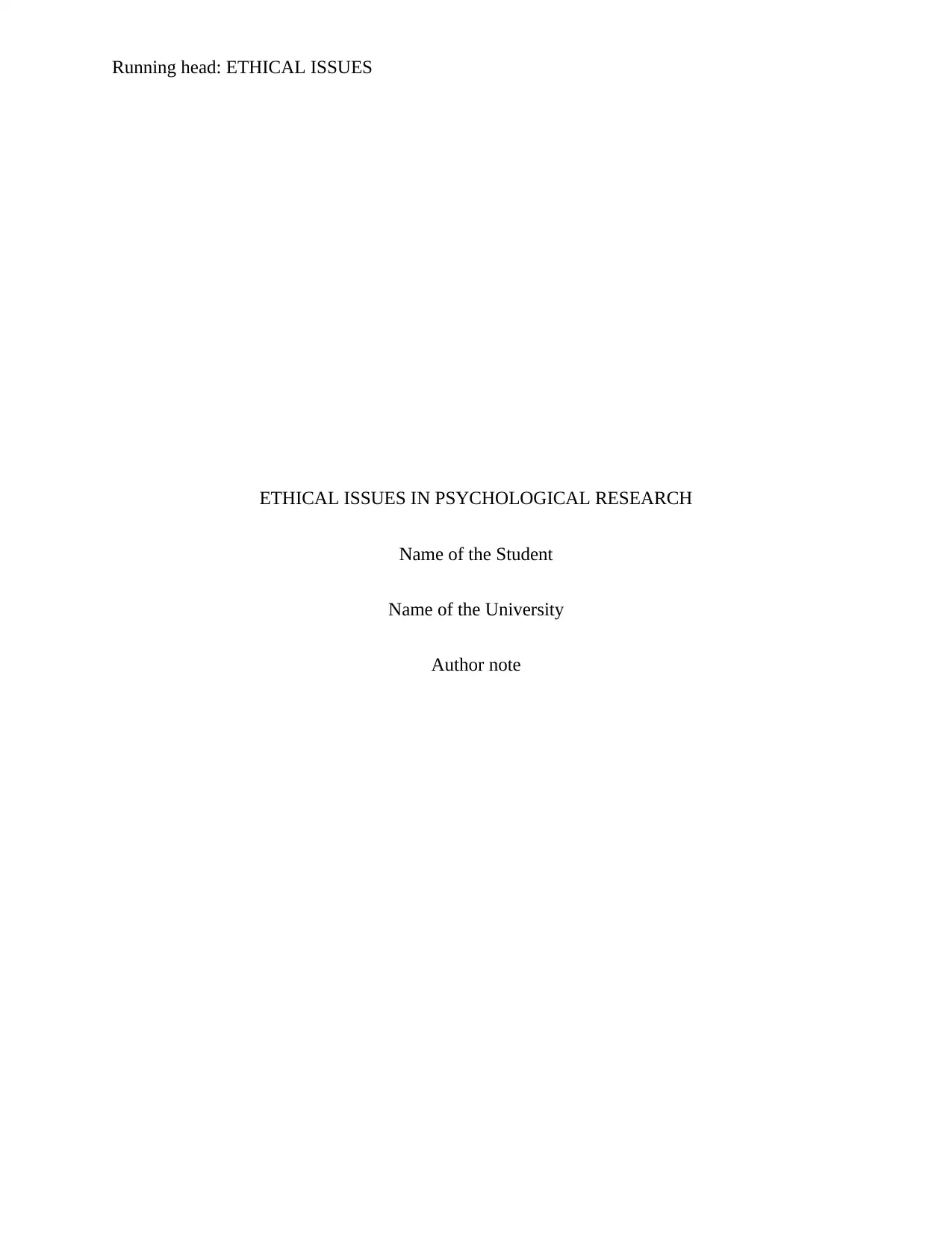
Running head: ETHICAL ISSUES
ETHICAL ISSUES IN PSYCHOLOGICAL RESEARCH
Name of the Student
Name of the University
Author note
ETHICAL ISSUES IN PSYCHOLOGICAL RESEARCH
Name of the Student
Name of the University
Author note
Paraphrase This Document
Need a fresh take? Get an instant paraphrase of this document with our AI Paraphraser
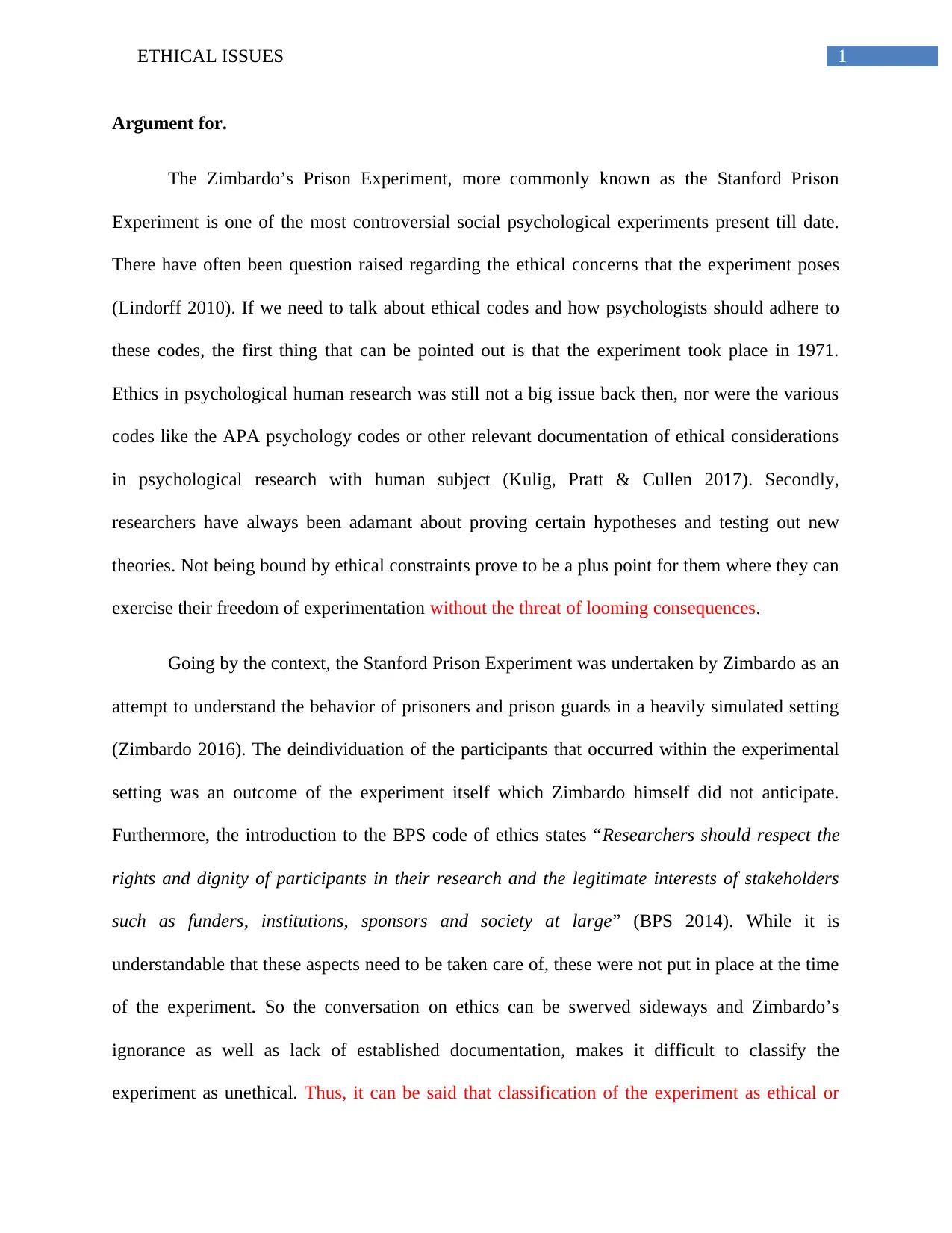
1ETHICAL ISSUES
Argument for.
The Zimbardo’s Prison Experiment, more commonly known as the Stanford Prison
Experiment is one of the most controversial social psychological experiments present till date.
There have often been question raised regarding the ethical concerns that the experiment poses
(Lindorff 2010). If we need to talk about ethical codes and how psychologists should adhere to
these codes, the first thing that can be pointed out is that the experiment took place in 1971.
Ethics in psychological human research was still not a big issue back then, nor were the various
codes like the APA psychology codes or other relevant documentation of ethical considerations
in psychological research with human subject (Kulig, Pratt & Cullen 2017). Secondly,
researchers have always been adamant about proving certain hypotheses and testing out new
theories. Not being bound by ethical constraints prove to be a plus point for them where they can
exercise their freedom of experimentation without the threat of looming consequences.
Going by the context, the Stanford Prison Experiment was undertaken by Zimbardo as an
attempt to understand the behavior of prisoners and prison guards in a heavily simulated setting
(Zimbardo 2016). The deindividuation of the participants that occurred within the experimental
setting was an outcome of the experiment itself which Zimbardo himself did not anticipate.
Furthermore, the introduction to the BPS code of ethics states “Researchers should respect the
rights and dignity of participants in their research and the legitimate interests of stakeholders
such as funders, institutions, sponsors and society at large” (BPS 2014). While it is
understandable that these aspects need to be taken care of, these were not put in place at the time
of the experiment. So the conversation on ethics can be swerved sideways and Zimbardo’s
ignorance as well as lack of established documentation, makes it difficult to classify the
experiment as unethical. Thus, it can be said that classification of the experiment as ethical or
Argument for.
The Zimbardo’s Prison Experiment, more commonly known as the Stanford Prison
Experiment is one of the most controversial social psychological experiments present till date.
There have often been question raised regarding the ethical concerns that the experiment poses
(Lindorff 2010). If we need to talk about ethical codes and how psychologists should adhere to
these codes, the first thing that can be pointed out is that the experiment took place in 1971.
Ethics in psychological human research was still not a big issue back then, nor were the various
codes like the APA psychology codes or other relevant documentation of ethical considerations
in psychological research with human subject (Kulig, Pratt & Cullen 2017). Secondly,
researchers have always been adamant about proving certain hypotheses and testing out new
theories. Not being bound by ethical constraints prove to be a plus point for them where they can
exercise their freedom of experimentation without the threat of looming consequences.
Going by the context, the Stanford Prison Experiment was undertaken by Zimbardo as an
attempt to understand the behavior of prisoners and prison guards in a heavily simulated setting
(Zimbardo 2016). The deindividuation of the participants that occurred within the experimental
setting was an outcome of the experiment itself which Zimbardo himself did not anticipate.
Furthermore, the introduction to the BPS code of ethics states “Researchers should respect the
rights and dignity of participants in their research and the legitimate interests of stakeholders
such as funders, institutions, sponsors and society at large” (BPS 2014). While it is
understandable that these aspects need to be taken care of, these were not put in place at the time
of the experiment. So the conversation on ethics can be swerved sideways and Zimbardo’s
ignorance as well as lack of established documentation, makes it difficult to classify the
experiment as unethical. Thus, it can be said that classification of the experiment as ethical or
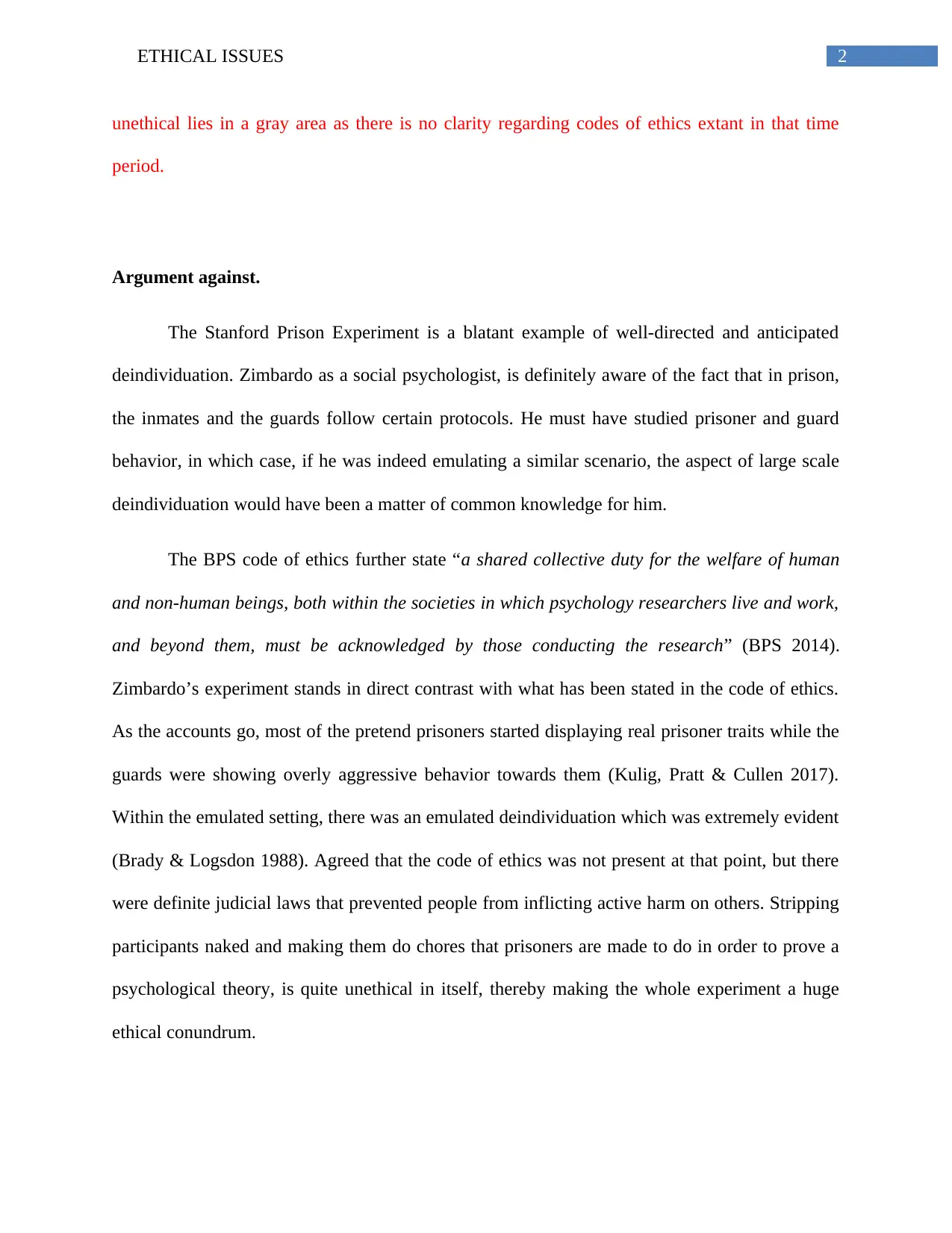
2ETHICAL ISSUES
unethical lies in a gray area as there is no clarity regarding codes of ethics extant in that time
period.
Argument against.
The Stanford Prison Experiment is a blatant example of well-directed and anticipated
deindividuation. Zimbardo as a social psychologist, is definitely aware of the fact that in prison,
the inmates and the guards follow certain protocols. He must have studied prisoner and guard
behavior, in which case, if he was indeed emulating a similar scenario, the aspect of large scale
deindividuation would have been a matter of common knowledge for him.
The BPS code of ethics further state “a shared collective duty for the welfare of human
and non-human beings, both within the societies in which psychology researchers live and work,
and beyond them, must be acknowledged by those conducting the research” (BPS 2014).
Zimbardo’s experiment stands in direct contrast with what has been stated in the code of ethics.
As the accounts go, most of the pretend prisoners started displaying real prisoner traits while the
guards were showing overly aggressive behavior towards them (Kulig, Pratt & Cullen 2017).
Within the emulated setting, there was an emulated deindividuation which was extremely evident
(Brady & Logsdon 1988). Agreed that the code of ethics was not present at that point, but there
were definite judicial laws that prevented people from inflicting active harm on others. Stripping
participants naked and making them do chores that prisoners are made to do in order to prove a
psychological theory, is quite unethical in itself, thereby making the whole experiment a huge
ethical conundrum.
unethical lies in a gray area as there is no clarity regarding codes of ethics extant in that time
period.
Argument against.
The Stanford Prison Experiment is a blatant example of well-directed and anticipated
deindividuation. Zimbardo as a social psychologist, is definitely aware of the fact that in prison,
the inmates and the guards follow certain protocols. He must have studied prisoner and guard
behavior, in which case, if he was indeed emulating a similar scenario, the aspect of large scale
deindividuation would have been a matter of common knowledge for him.
The BPS code of ethics further state “a shared collective duty for the welfare of human
and non-human beings, both within the societies in which psychology researchers live and work,
and beyond them, must be acknowledged by those conducting the research” (BPS 2014).
Zimbardo’s experiment stands in direct contrast with what has been stated in the code of ethics.
As the accounts go, most of the pretend prisoners started displaying real prisoner traits while the
guards were showing overly aggressive behavior towards them (Kulig, Pratt & Cullen 2017).
Within the emulated setting, there was an emulated deindividuation which was extremely evident
(Brady & Logsdon 1988). Agreed that the code of ethics was not present at that point, but there
were definite judicial laws that prevented people from inflicting active harm on others. Stripping
participants naked and making them do chores that prisoners are made to do in order to prove a
psychological theory, is quite unethical in itself, thereby making the whole experiment a huge
ethical conundrum.
⊘ This is a preview!⊘
Do you want full access?
Subscribe today to unlock all pages.

Trusted by 1+ million students worldwide
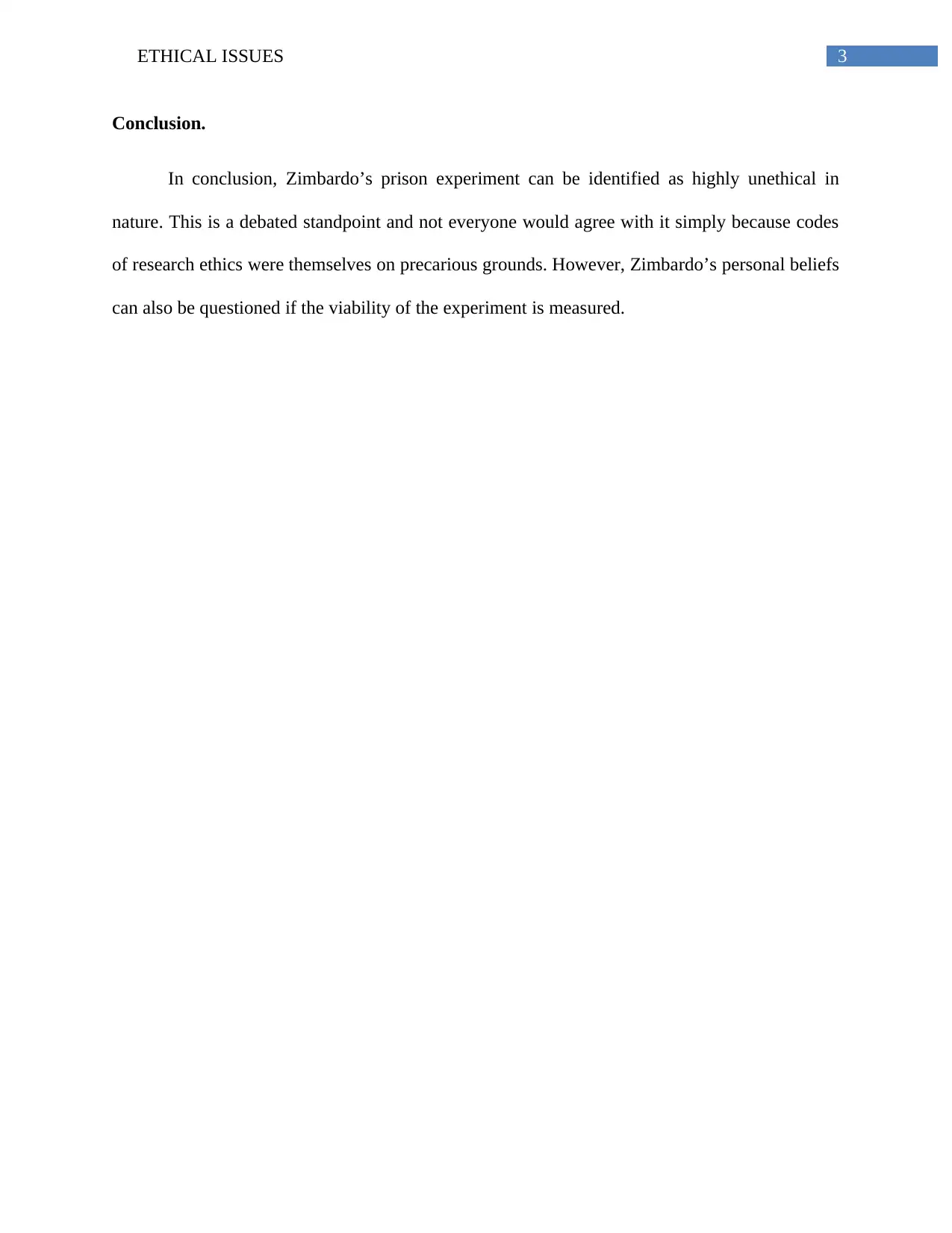
3ETHICAL ISSUES
Conclusion.
In conclusion, Zimbardo’s prison experiment can be identified as highly unethical in
nature. This is a debated standpoint and not everyone would agree with it simply because codes
of research ethics were themselves on precarious grounds. However, Zimbardo’s personal beliefs
can also be questioned if the viability of the experiment is measured.
Conclusion.
In conclusion, Zimbardo’s prison experiment can be identified as highly unethical in
nature. This is a debated standpoint and not everyone would agree with it simply because codes
of research ethics were themselves on precarious grounds. However, Zimbardo’s personal beliefs
can also be questioned if the viability of the experiment is measured.
Paraphrase This Document
Need a fresh take? Get an instant paraphrase of this document with our AI Paraphraser
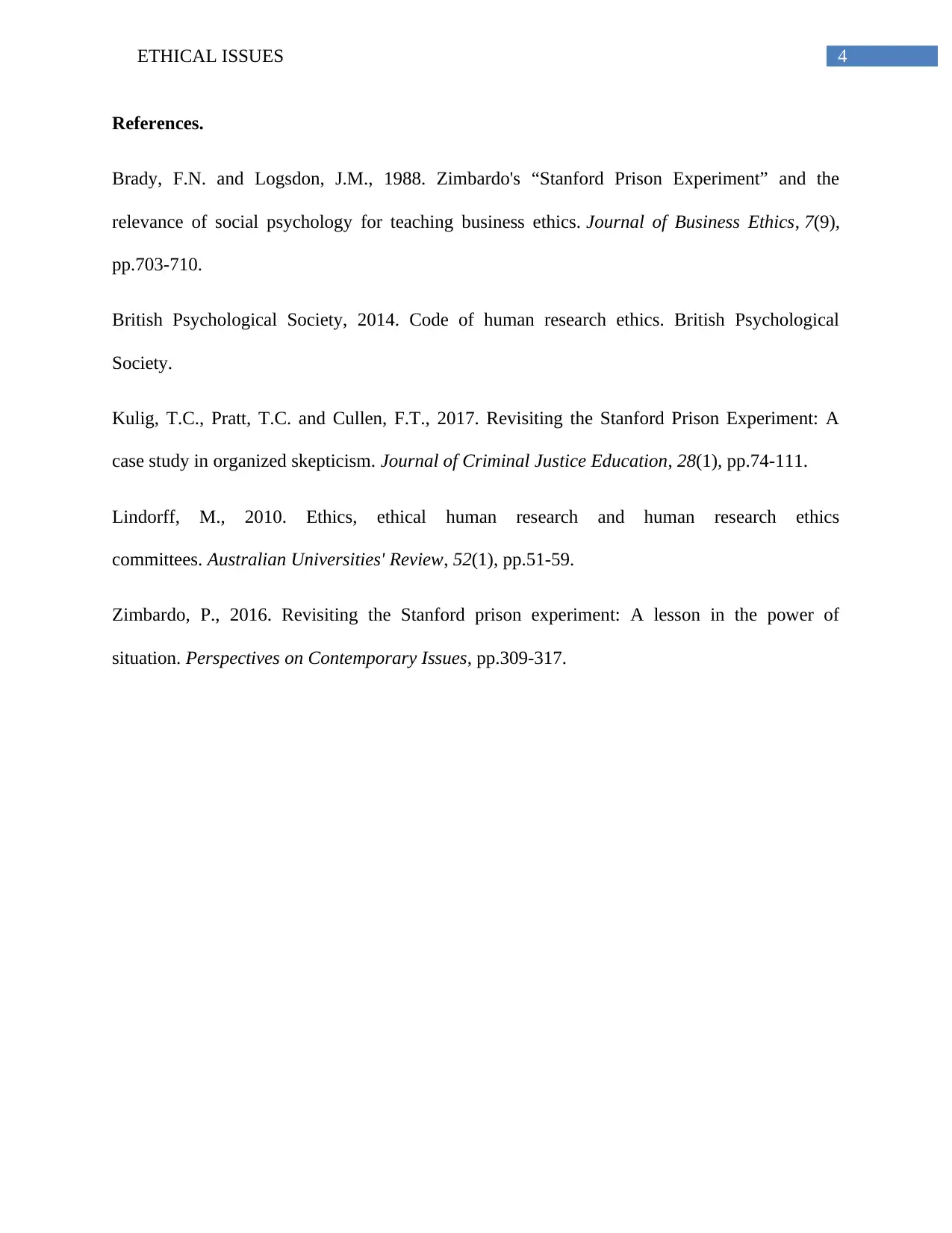
4ETHICAL ISSUES
References.
Brady, F.N. and Logsdon, J.M., 1988. Zimbardo's “Stanford Prison Experiment” and the
relevance of social psychology for teaching business ethics. Journal of Business Ethics, 7(9),
pp.703-710.
British Psychological Society, 2014. Code of human research ethics. British Psychological
Society.
Kulig, T.C., Pratt, T.C. and Cullen, F.T., 2017. Revisiting the Stanford Prison Experiment: A
case study in organized skepticism. Journal of Criminal Justice Education, 28(1), pp.74-111.
Lindorff, M., 2010. Ethics, ethical human research and human research ethics
committees. Australian Universities' Review, 52(1), pp.51-59.
Zimbardo, P., 2016. Revisiting the Stanford prison experiment: A lesson in the power of
situation. Perspectives on Contemporary Issues, pp.309-317.
References.
Brady, F.N. and Logsdon, J.M., 1988. Zimbardo's “Stanford Prison Experiment” and the
relevance of social psychology for teaching business ethics. Journal of Business Ethics, 7(9),
pp.703-710.
British Psychological Society, 2014. Code of human research ethics. British Psychological
Society.
Kulig, T.C., Pratt, T.C. and Cullen, F.T., 2017. Revisiting the Stanford Prison Experiment: A
case study in organized skepticism. Journal of Criminal Justice Education, 28(1), pp.74-111.
Lindorff, M., 2010. Ethics, ethical human research and human research ethics
committees. Australian Universities' Review, 52(1), pp.51-59.
Zimbardo, P., 2016. Revisiting the Stanford prison experiment: A lesson in the power of
situation. Perspectives on Contemporary Issues, pp.309-317.
1 out of 5
Related Documents
Your All-in-One AI-Powered Toolkit for Academic Success.
+13062052269
info@desklib.com
Available 24*7 on WhatsApp / Email
![[object Object]](/_next/static/media/star-bottom.7253800d.svg)
Unlock your academic potential
Copyright © 2020–2026 A2Z Services. All Rights Reserved. Developed and managed by ZUCOL.




